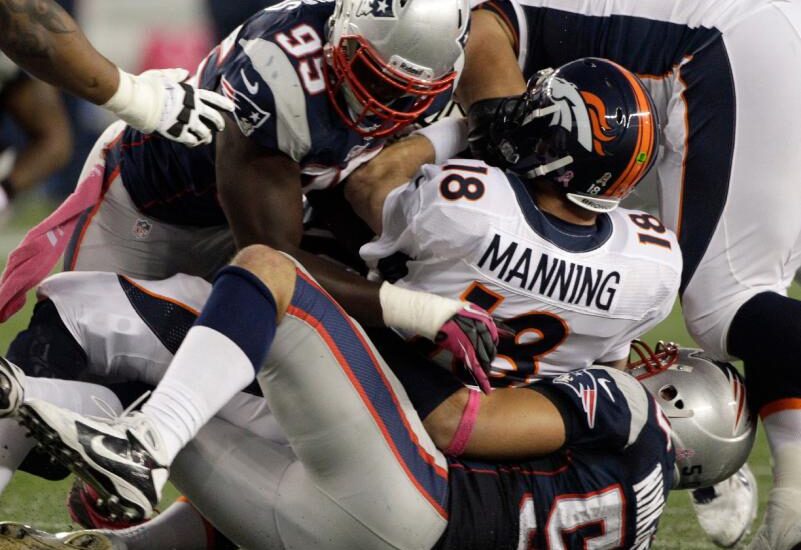- November 19, 2014
- Posted by: Dave Kurlan
- Category: Understanding the Sales Force

Did you ever watch Peyton Manning, Tom Brady or Aaron Rogers have a bad day at Quarterback? Did you notice that the following day, everyone was saying that he sucked? While it’s possible that these three Quarterbacks could have a bad day, most of their bad days are less about them and more about whether or not their offensive lines gave them the time and protection they needed to find an open man and make a good pass. It could also have something to do with whether or not their receivers were able to quickly get open. Give a good Quarterback enough time and they will make you pay. Put enough pressure on them and they can look as bad as anyone else. In football, it’s all about cause and effect. Bad quarterbacking by a good Quarterback is usually the effect, not the cause of the bad performance.
The same thing is true in sales. We get calls and emails here all day long from busy executives of growing companies who mistakenly believe that they know what they need help with. The Top 5 Requests are:
- Selling Value
- Negotiating Skills
- Presentation Skills
- Forecasting
- Closing Skills
In fairness, most salespeople could stand to improve in these areas, but these are not root causes as much as they are effects. These five items are the sales equivalent to Quarterbacks having a difficult day. What we really need to know are, what are the sales equivalents to the offensive line’s ability to protect and the receiver’s ability to get open? Let’s review these one by one.
Selling Value
Establishing indisputable value to a customer is an outcome based on a collection of capabilities. It requires that a salesperson have supportive Sales DNA, specifically in the areas of being comfortable talking about money, having a high money tolerance, being a value buyer and not needing to be liked. It requires that salespeople have consultative selling skills in order to differentiate, uncover compelling reasons to buy from them, and conduct the conversation nobody else is having. It requires having the ability to connect all the dots, in just the right way, at just the right time. And finally, there must be a philosophy about selling value and related strategy in place. To learn more about selling value, join me on November 25 for our presentation on How to Sell Value in Modern Times.
Negotiating
Negotiating is a trap door that salespeople fall through when, as with value selling, they lack the complete collection of capabilities required to avoid negotiating. Negotiating is not something in which salespeople should strive to improve. It’s something they can completely avoid. They must have supportive Sales DNA, specifically, an ability to stay in the moment, be rejection-proof, and not need to be liked. Even more than with selling value, salespeople must be able to uncover that compelling reason to do business with them and differentiate better than anyone else to have the conversation that nobody else is having with their prospects. It requires that they have the ability to quantify, cost-justify, and provide a compelling argument for ROI. Finally, avoiding negotiation requires salespeople to possess excellent qualifiying skills!
Presentation Skills
A presentation is only as good as what was presented, why it was presented, who it was presented to and when it was presented. Most salespeople present features and benefits instead of solutions, present too early in the sales process, present to the wrong people, and present for the wrong reasons. The real cause here is a faulty sales process, with demos and presentations mistakenly being sequenced as a milestone to gain interest, instead of a milestone to seal the deal.
Forecasting
A forecast is a human prediction being made by software applications. The problem is not with the software, as much as it’s with the humans that enter the data and override the variables. The real blame must be given to sales process and qualification. Sales processes that have been inappropriately staged and sequenced will always cause forecasting nightmares. When it comes to qualification, there are usually two issues. The first is that salespeople regularly fail to thoroughly qualify because they have chronic cases of Happy Ears. The second issue is that qualification frequently occurs at the wrong time – either much too early in the sales process, before a prospect has a compelling reason to participate in qualification, or way too late in the process, when salespeople finally learn why a deal hasn’t yet closed.
Closing Skills
It appears to many that closing skills are perhaps the most important set of skills a salesperson could have, but the science says otherwise. Closing is an outcome that occurs naturally and easily after salespeople have thoroughly and effectively navigated all of the prior milestones and stages in their sales process. Therefore, an apparent lack closing skills is really caused by an ineffective sales process, insufficient Sales DNA, a large skill gap, and most importantly, an inability to sell consultatively and thoroughly qualify.
Do you like my Blog? Support it by voting for Understanding the Sales Force as Top Sales Blog at Top Sales Awards.
Register for the Top 5 Hidden Factors That Determine the Fate of Your Sales Force – a 45-minute presentation on December 10 at 11 AM Eastern Time.
Read my article over at the Hubspot Blog – What Effective Role Playing Sounds Like.

